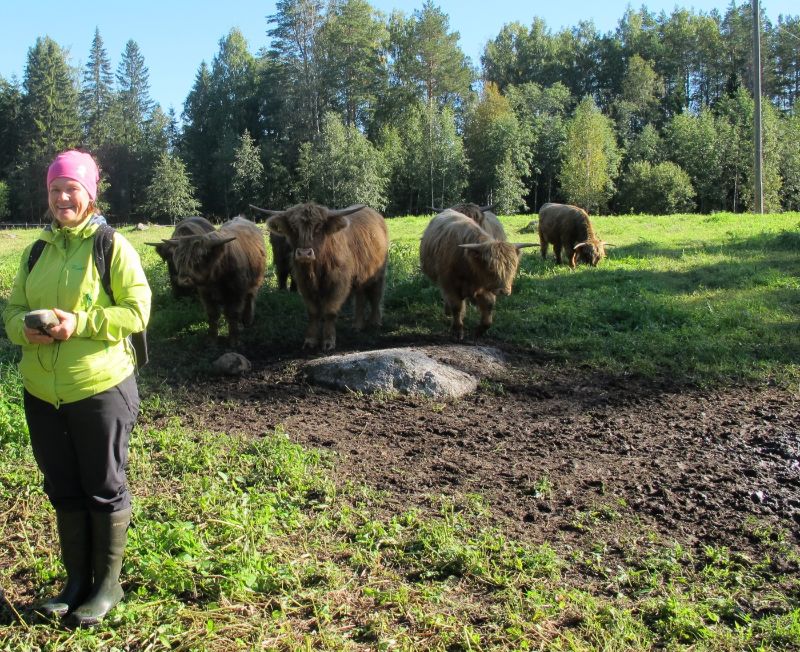Specialist, agriculture
"The purpose of this position is to slow down biodiversity loss. In addition to climate change, biodiversity loss is one of the greatest threats to our future. The importance of special expertise related to biodiversity loss will be emphasised in the future."

- Merja Lehtinen
- Specialist at the support and monitoring group of the Business and Industry area of responsibility at the ELY Centre for Central Finland.
- Graduated as Bachelor of Natural Resources from North Karelia University of Applied Sciences and as Master of Natural Resources from Häme University of Applied Sciences.
- 20 years of work experience in the field.
Briefly explain what you do for a living.
In my work, I conclude agreements related to EU subsidies with farmers and landowners who want to manage and maintain traditional biotopes, natural pastures and multifunctional wetlands. The subsidies we grant are partly funded by the EU.
How have you ended up in the profession of your choice?
I ended up in the field largely by a coincidence. I wasn’t admitted to study in the health care programme that was my first choice. I was bummed out when I didn’t get in on my second try. At that time, a joint application was also under way, and Jämsä Agricultural College had an open call for applications for a general course. I thought that even if I didn’t want to continue with agricultural studies, I would at least learn useful practical skills. I’m a second-generation city dweller, but my father’s family had a farm where I went to help in the summer. In the end, I found the course interesting and wanted to become Bachelor of Natural Resources. I got admitted to Iisalmi’s Peltosalmi Agricultural College, which preceded the current Savonia University of Applied Sciences.
Describe your typical working day or week.
My work is very different in summer and winter. We work in the field from the beginning of May when we start to inspect areas for which an application has been submitted. We meet with farmers and examine the farms’ capabilities of managing valuable traditional biotopes, natural pastures or wetlands. We discuss the requirements for management, take photos and measure the surface areas of the parcels. I work with a biologist partner from the Environment area of responsibility. We agree on the next step with the applicant, that is, whether the area will be approved or excluded. The winter season begins when it snows. During winter, I prepare agreements and help in the processing of their payment and recovery matters. I also train applicants and stakeholders so that information on available subsidies reaches potential applicants.
What kind of work environment or working hours do you have?
I work during office hours, that is, between 8:00 and 16:00. In summer, I work in forests, meadows and wetland areas. In winter, I work at the ELY Centre’s office or remotely from my home office.
What kind of competence or qualities are required in the profession?
This position requires knowledge of EU and national law, agriculture, natural sciences and wetland construction. You must also have competence in measuring surface areas and digitising maps, cooperation skills and social characteristics. The position requires motivation, and the information related to EU law and guidelines must be updated by programme period. Accuracy, thoroughness and the ability to get along with different people are also required.
What is the best thing about your profession?
The best things in this work are diverse work tasks and the opportunity to spend a lot of time outdoors in summer. As a nature person, it’s nice to see wonderful nature sites and monitor their development. I also like meeting different kinds of clients.
What are the downsides of the profession or what seems challenging?
I sometimes feel pressure and stress when work keeps piling up. When the 5–7 years programme period changes, the changes pose challenges, as many things need to be relearned and put into practice. Being at the mercy of the weather also feels challenging if the summer is rainy or really hot.
What would you tell a person considering the profession of a agriculture specialist?
Study agriculture, forestry or biology, apply to the ELY Centre for work placement and apply for a field inspection position, after which you can proceed to a specialist position.
How do you see the future of your profession?
I see it as positive. The purpose of this position is to slow down biodiversity loss. In addition to climate change, biodiversity loss is one of the greatest threats to our future. The importance of special expertise related to biodiversity loss will be emphasised in the future.
